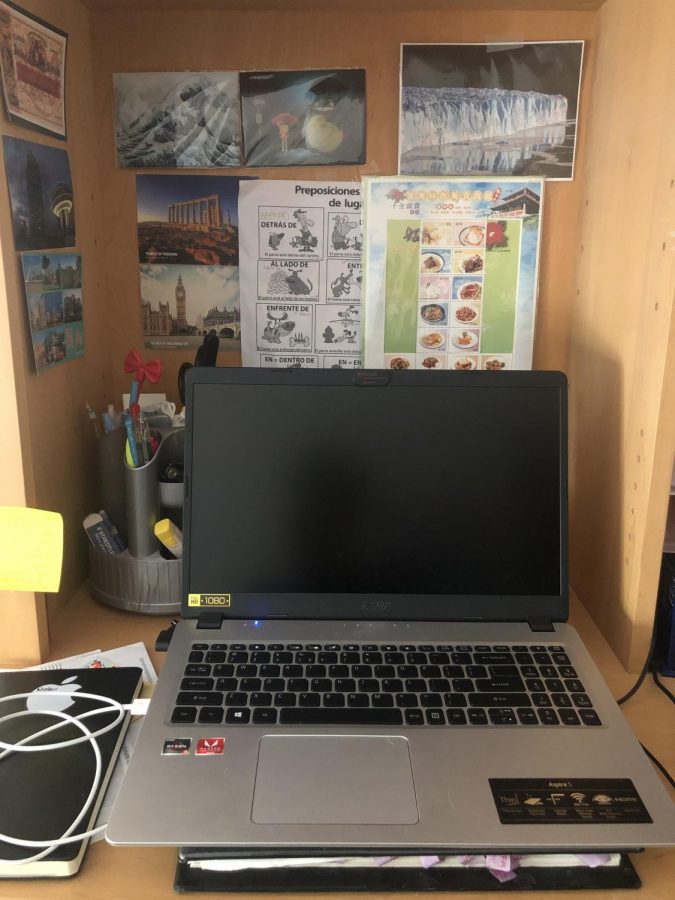Teacher Perspective: ‘We all have our good days and bad days’
Photo Kaitlin Bavaro
Kim Ou-Yang’s home workspace
As we reach the end of the 2019-2020 school year, classes are continuing to be held virtually. While this has taken some adjusting for students, it has been just as difficult for WHS teachers. World Language Teacher Kim Ou-Yang definitely did not expect to be finishing out the year this way.
“At the very beginning, I didn’t think that [the coronavirus] would be this bad,” Ou-Yang said. “I kept on thinking that we would go back to school.” When COVID-19 continued to escalate, Ou-Yang thought that we would at least come back in May or June.
There have been a few challenges that Ou-Yang has had to face in regards to teaching her students online. A major obstacle has been technical issues, such as getting Google Meet to work for each class. Ou-Yang also regrets leaving a lot of important materials behind, including
her school laptop. “It’s definitely been a balancing act because we want the students to be okay, and we want to be tolerant and understanding of everyone’s situation because everyone’s affected by it. Yet, at the same time, it’s really difficult sometimes to have students follow directions, or to get the messages across and make sure that everyone is on the same page,” Ou-Yang said.
She also noted that this has been an issue for her colleagues too, as they are trying to be as flexible as they can with assignments.
Being able to help her students virtually has also been a bit of a challenge. Ou-Yang said, “When we had school, students could just pop by my classroom and ask a quick question, even if it was during class or in between classes. That’s really hard now, even though we do have office hours, I don’t think that everyone is taking advantage of them.”
The thing that Ou-Yang misses the most is seeing her students’ faces and interacting with them each day. “For my classes I show a lot of videos that have to do with Chinese culture and I love teaching students about it. We still are able to watch videos together online but when I show them I can only view the video, so I can’t even see their faces. I also like to share songs with my students, and in class we would normally sing along and be pretty loud, but that’s not possible with online learning,” she said.
Some days Ou-Yang finds that her students are very interactive and engaged, and other times she finds that it can be hard to motivate everyone. “We all have our good days and bad days,” Ou-Yang said.
Ou-Yang noted that not everyone has cameras and microphones that work, and that makes it difficult for students to be interactive and participating. However, Ou-Yang also stated that many of her students are good about sending her emails about questions that they might have.
Ou-Yang has lived in the U.S. as well as in Taiwan, one of the first places in the world to be affected by the coronavirus. She said, “Even though I don’t know anyone living in Taiwan who has had the virus, I do know that everyone that is living there has been affected [in some way].”
Constantly reading new articles has caused Ou-Yang to think critically about life both in America and in Taiwan: “For me, it’s not just thinking about what we’re going to do next week, or when we get back to school in September, but really seeing and understanding how it’s going to affect all of us in all of our ways, like sports and public events.”
Ou-Yang said that during her time in quarantine she has stopped reading hard news articles and now focuses on the more positive news. She explained that seeing the hard work that many people have been doing to help out has helped her stay optimistic during this time.
Ou-Yang is trying to do her part to spread positivity as well. “I do what I can as a teacher to try to keep everyone motivated, like every Friday I’ll post funny videos or articles that are related to Chinese culture to try to keep everyone’s spirits high,” said Ou-Yang. “I know this time is difficult for seniors and especially for those who have lost loved ones.”
If Ou-Yang could go back in time to right before we left school, she would give a proper goodbye to her students. She said, “I’m not really a touchy person, but I think I would’ve high-fived everyone at least, or try to hug some of my students if I had known that I wouldn’t have ever seen some of them again. I know I’ll really miss the seniors, especially because I would’ve loved to go to prom or graduation and see them.”
Ou-Yang’s final statement for her students: “I would like students to know that they are a lot stronger and more resilient than we had imagined, and I think that they are still trying very hard to learn and to get something out of these classes.”

